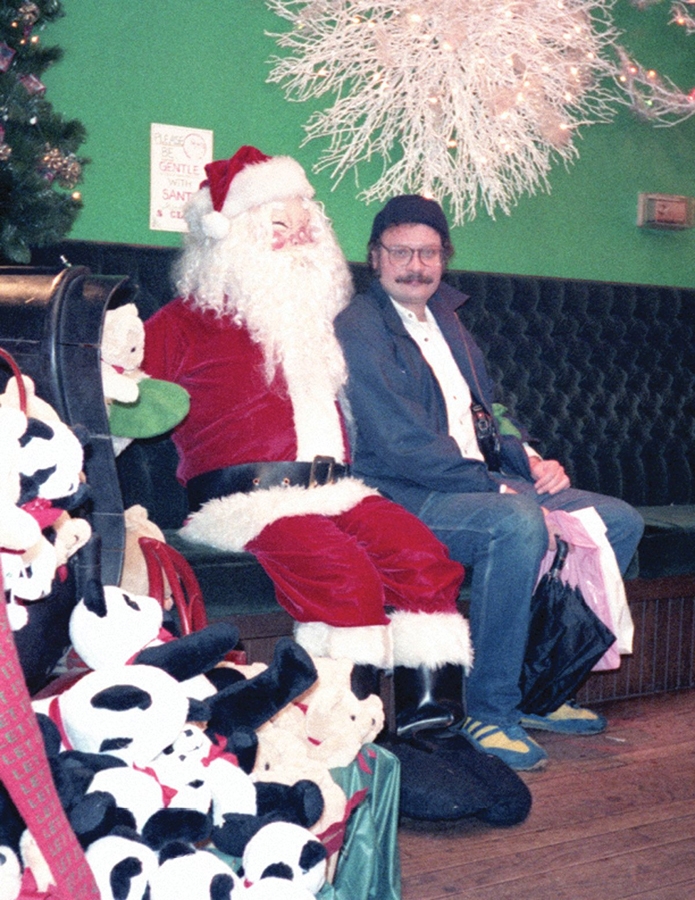In the fuzzy snapshot on the cover of this book, George Kuchar is sitting next to a giant inflatable Santa Claus doll and gazing at us with the twinkling eyes of a happy pervert. It’s a good hint of the carnival to be found in the 300 pages of collected detritus that follow, and in the 200 or so films – mostly shorts and fragments – that he left his oddball fingerprints all over from the 1960s until 2011: trashy, a little disconcerting and weirdly heartwarming.
Pieces of private mischief arranged according to an incomprehensible syntax, antic and excitable as Tex Avery’s cartoons, the typical Kuchar film – if such a thing can be said to exist – is a sloppy concoction of pulp horror, hysterical melodrama and homemade Surrealism containing frequent throbs of homoerotic longing. Their titles are a joy to recite: The Deafening Goo (1989), Hold Me While I’m Naked (1966), The Mongreloid (1978), Fill Thy Crack With Whiteness (1989)… He was an unashamed chronicler of the body’s everyday filth – nobody else has found so much sorrow in filming motel toilets. What’s oddest of all about them, perhaps, is that you never think he’s getting nasty thrills at any genre’s expense but cherishes them all with the same goofy fervour a schoolgirl might save for some Tiger Beat magazine dreamboat. Out of all his underground bedfellows – Jack Smith or John Waters in his especially grotesque early years – Kuchar finds the most genuine delight in Hollywood’s flights of fancy. But his works also possess a disarming contemporary resonance: compulsively personal to the point of childlike inscrutability – long before such things were routine – they pay attention to nothing beyond their own freakish whims or immediate surroundings and depend upon the cheapest means available to transmit them. Bruce LaBruce, Alex Bag and Sadie Benning – to name a few – might all claim Kuchar as the magical (and promiscuous) grandfather who inspired their own experiments. Add to this ever-intensifying sense of prescience the fact that he and his twin brother, Mike, conjured up several brainscrambling masterpieces while they were teens in the Bronx, and Kuchar starts to look almost heroic.
This wayward scrapbook makes for a fantastical counterpart to the films, cataloguing all sorts of junk and wonders into a stream-of-consciousness bizarrerie
This wayward scrapbook makes for a fantastical counterpart to the films, cataloguing all sorts of junk and wonders into a stream-of-consciousness bizarrerie. It includes various bemused responses from science magazines to Kuchar’s reports of alien encounters, a grungy photograph of George Lucas, a touching centrefold painting of his beloved dog Bocko as a splayed and dreaming swirl of fur, purple watermelon testicles and all, plus a dirty comic strip about Marlene Dietrich – Kuchar’s cartoons are lively, wicked and jelly-smooth in their execution. His prose has a hallucinogenic irreverence, too, involving a screwball riot of ‘angels sneezing green slime on their harps’, ‘Cocoa Puff cosmology’ and memories of boys participating in ‘full-figured shenanigans’. In all this cavorting you might miss the peculiar pathos of everything here and forget that, say, Eclipse of the Sun Virgin (1967) is at heart something like the reverie of a hornier Joseph Cornell, just as moony and vulnerable, with equal tenderness for domestic ephemera and suburban gloom. Pawing through someone’s archive always has an attendant melancholy even when the contents look as if they were compiled by a lustful monster movie enthusiast.
Here and there this stuff has the capacity to be as seemingly insignificant but devastating as Kuchar’s six Weather Diaries (1986–90), videotapes that are at once lulling accounts of the aftermaths of storms, full of empty fields and fog, and raw confessions about his ageing body narrated in his trademark adenoidal whine. Anguish rumbles through the book’s last section, which consists entirely of his deathbed intimations to a friend about his lovesickness over a longtime – and outwardly straight – companion. The whole thing aches with strange desires, things that need to come out somehow, ‘otherwise’, as he confides towards the end, ‘it all gets very confusing’.
This article was first published in the December 2014 issue.
